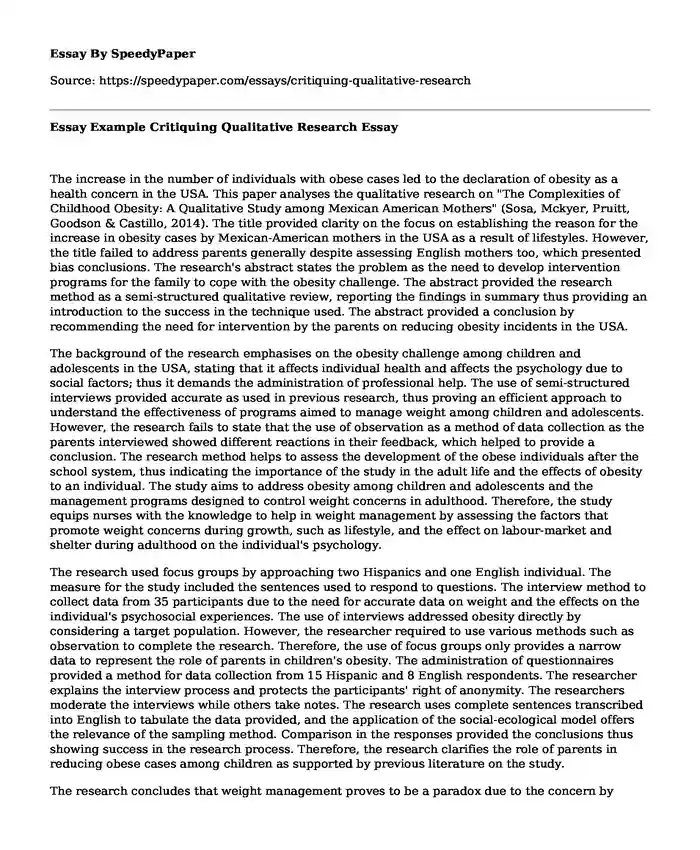The increase in the number of individuals with obese cases led to the declaration of obesity as a health concern in the USA. This paper analyses the qualitative research on "The Complexities of Childhood Obesity: A Qualitative Study among Mexican American Mothers" (Sosa, Mckyer, Pruitt, Goodson & Castillo, 2014). The title provided clarity on the focus on establishing the reason for the increase in obesity cases by Mexican-American mothers in the USA as a result of lifestyles. However, the title failed to address parents generally despite assessing English mothers too, which presented bias conclusions. The research's abstract states the problem as the need to develop intervention programs for the family to cope with the obesity challenge. The abstract provided the research method as a semi-structured qualitative review, reporting the findings in summary thus providing an introduction to the success in the technique used. The abstract provided a conclusion by recommending the need for intervention by the parents on reducing obesity incidents in the USA.
The background of the research emphasises on the obesity challenge among children and adolescents in the USA, stating that it affects individual health and affects the psychology due to social factors; thus it demands the administration of professional help. The use of semi-structured interviews provided accurate as used in previous research, thus proving an efficient approach to understand the effectiveness of programs aimed to manage weight among children and adolescents. However, the research fails to state that the use of observation as a method of data collection as the parents interviewed showed different reactions in their feedback, which helped to provide a conclusion. The research method helps to assess the development of the obese individuals after the school system, thus indicating the importance of the study in the adult life and the effects of obesity to an individual. The study aims to address obesity among children and adolescents and the management programs designed to control weight concerns in adulthood. Therefore, the study equips nurses with the knowledge to help in weight management by assessing the factors that promote weight concerns during growth, such as lifestyle, and the effect on labour-market and shelter during adulthood on the individual's psychology.
The research used focus groups by approaching two Hispanics and one English individual. The measure for the study included the sentences used to respond to questions. The interview method to collect data from 35 participants due to the need for accurate data on weight and the effects on the individual's psychosocial experiences. The use of interviews addressed obesity directly by considering a target population. However, the researcher required to use various methods such as observation to complete the research. Therefore, the use of focus groups only provides a narrow data to represent the role of parents in children's obesity. The administration of questionnaires provided a method for data collection from 15 Hispanic and 8 English respondents. The researcher explains the interview process and protects the participants' right of anonymity. The researchers moderate the interviews while others take notes. The research uses complete sentences transcribed into English to tabulate the data provided, and the application of the social-ecological model offers the relevance of the sampling method. Comparison in the responses provided the conclusions thus showing success in the research process. Therefore, the research clarifies the role of parents in reducing obese cases among children as supported by previous literature on the study.
The research concludes that weight management proves to be a paradox due to the concern by parents about their children sizes due to the perception that the increase in weight symbolises good health practices. Therefore, the research indicates the achievement by providing the understanding among parents on physical appearance as a factor for health among children. The research provides the knowledge that nurses require to approach childhood obesity from the mothers' perception, thus reflecting the findings. However, the research fails to give ethical concerns and measures taken to control childhood obesity but protects the participants in the research by providing anonymity.
Reference
Sosa, E. T., Mckyer, E. L., Pruitt, B., Goodson, P., & Castillo, L. (2014). The complexities of childhood obesity: A qualitative study among Mexican American mothers. Journal of Health Disparities Research and Practice, 8(3), 1.
Cite this page
Essay Example Critiquing Qualitative Research. (2022, Aug 31). Retrieved from https://speedypaper.net/essays/critiquing-qualitative-research
Request Removal
If you are the original author of this essay and no longer wish to have it published on the SpeedyPaper website, please click below to request its removal:
- Free Essay Example on FIFA Corruption
- Literary Essay Sample - Raisin in the Sun: A Tale of Dreams
- Life Changing Event Essay Sample
- Essay Sample on Communication Between the Nurse Practitioner and the Family
- Social Issues in Arrival - Movie Review Essay Example
- Teamwork and Decision-Making - Reflective Journal Paper Example
- Essay Example - Educational Policy Analysis
Popular categories





